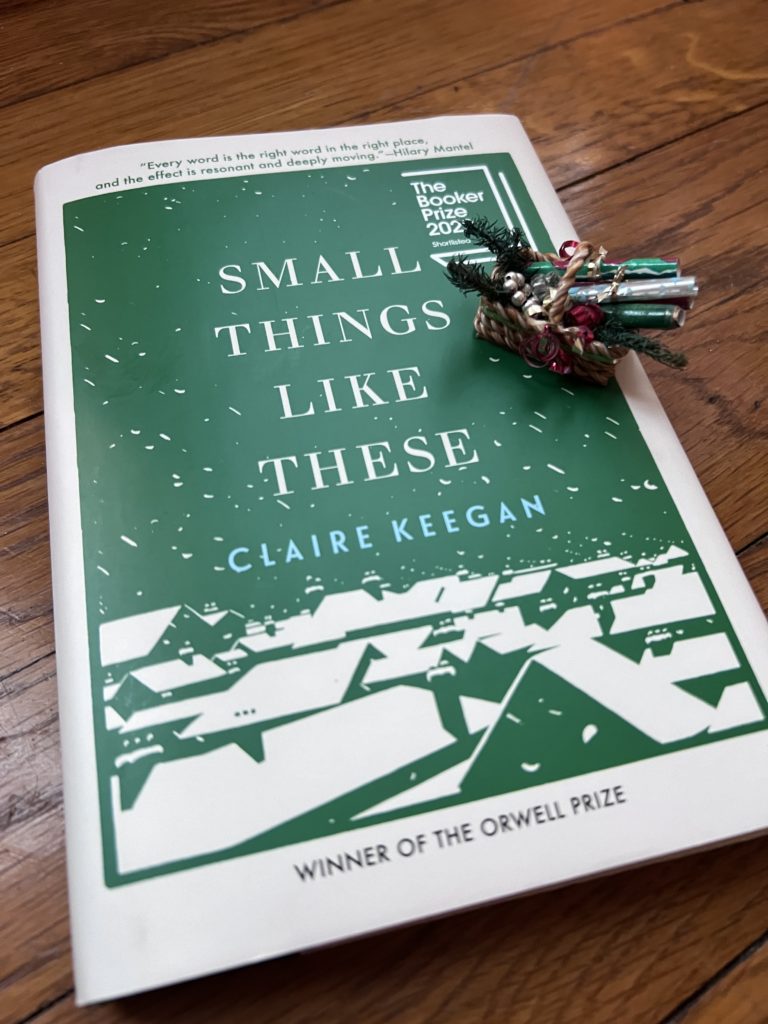“Before going back into the house, he’d washed his face at the horse-trough, breaking the ice on the surface, pushing his hands down deep in the cold and keeping them there, to divert his pain, until he could no longer feel it.” Small Things Like These by Claire Keegan
Chilling Times
Note to self: if you go to Ireland in the winter, bring an extra pair of boots.
From the very beginning of Small Things Like These, we know this is going to be a cold novella. It is beautifully written and expertly crafted so that every page chills the holiday spirit. Consider: “And then the nights came on and the frosts took hold again, and blades of cold slid under doors and cut the knees of those who still knelt to say the rosary.” Many readers will see this as a novel of hope and courage, others may not. Set during the Christmas season in a small, economically-depressed Irish town in the 1980s, it features a middle-aged self-made man, Bill Furlong.
Furlong is a coal merchant who is getting by. He is married to the woman he loves; he is proud of his five daughters, all of whom are excelling in the best school in town. He acknowledges the good life he has built, yet worries that he will lose it all. His thoughts from the start are depressive. Here is our hero, a few nights before Christmas after attempting a conversation with his wife: “Not for the first time, Furlong felt that he was poor company for her, that he seldom made a long night shorter.”
Furlong is in a sulky, reflective mood. His work is hard and unrelenting. His wife doesn’t want to hear about the “small things” that are important to him such as giving away his last bit of change, or going out of his way to help someone who needs a ride. He is concerned for his children and thinks: “They could be like young witches sometimes, his daughters, with their black hair and sharp eyes.” This gloomy melancholy oozes in and out of the cold arches of the story.
Why is he in such a funk? I believe he qualifies as a man in a mid-life crisis — one expects to see a sports car suddenly appear in his driveway. After all, Furlong is weary from the monotonous rush and smallness of his life. He can’t stop thinking about his past — and the unfortunate realities of it. He was raised in a rich woman’s home, a housekeeper’s bastard son. We hear of many details: his mother’s low station, his outcast standing, his ignorance of his father’s identity, etc.
As he wanders farther down the path of nostalgia, his unease with his current life grows and he searches for an alternative path. “For a time he stood listening and looking down at the town, at the smoke starting up from the chimneys and the small, diminishing stars in the sky. One of the brightest fell while he was standing there, leaving a streak like a chalk mark on a board for just a second before it vanished. Another seemed to burn out and slowly fade.”
This novella doesn’t have the length necessary to explore the fullness of the situation it beautifully presents in the first half of the story. In the second half, the author has taken shortcuts and has failed to provide critical scenes. Consequently, the second half feels contrived; too many coincidences occur. Furlong wanders around the convent (why?), stumbles into girls scrubbing a chapel floor and later finds one of those girls in the coal shed. It isn’t clear why she is there — the reader has to fill in the back story. The girl asks him to help her find her baby and/or escape. While Furlong ponders the encounter, a nun appears, reclaims the girl, and invites him in to tea. During the course of this tea, an unattractive, machismo, side of him emerges: “He sat on, encouraged by this queer new power. He was, after all, a man amongst women here.”
Leaving the convent, he continues to ruminate over the girl, but now with a different spirit. He doesn’t discuss her with his wife or a trusted friend or try to find a legitimate way to help her. Rather, without a clear understanding of her situation, he internalizes what he imagines her plight is and begins to liken her fate with that of his mother. It is now Christmas Eve, he plods through hours, visiting destinations of his life, receiving warnings in every direction he turns. “For a while, he simply walked along the quayside with his hands deep in his pockets, thinking over what he’d been told and watching the river flowing darkly along, drinking the snow.” All the while, he is building up courage to act. He wants to get the girl away from the convent. However, he knows that doing so will risk the well-being of his business, his marriage, and his daughters’ futures. Will he trade the life that he worked hard to achieve for the chance at being a hero in his own heart?
“It would be the easiest thing in the world to lose everything, Furlong knew.”
(FYI: the narrator demonstrates bias against Catholicism, e.g. jabbing sentences and metaphors such as slicing the knees off of the faithful praying the rosary, likening destructive crows to nuns, spiking the convent.)

A favorite sentence:
“Magically, then, the streets seemed to change and come alive under the long strands of multi-colored bulbs which swayed, pleasantly, in the wind above their heads.”